After more than two decades working on immigration policy in Congress (metaphorically clearing the path for the construction of a border wall and often proverbially beating my head against the wall), I have finally figured out why Congress repeatedly ignores the will of the American people as to immigration. With apologies to Steven Camarota and Roy Beck, it is simply because immigrants view Congress much more favorably than do the native-born — and Congress knows it! When asked how much they trust Congress, 16.9 percent of the foreign-born have a great deal of trust, compared to only 5.2 percent of the native-born. Now, 16.9 percent may not seem like a ringing endorsement, but it is over three times the level of trust exhibited by natives. And conversely, 28.3 percent of immigrants have hardly any trust in Congress, compared to the disdain displayed by a majority of natives (56.5 percent).
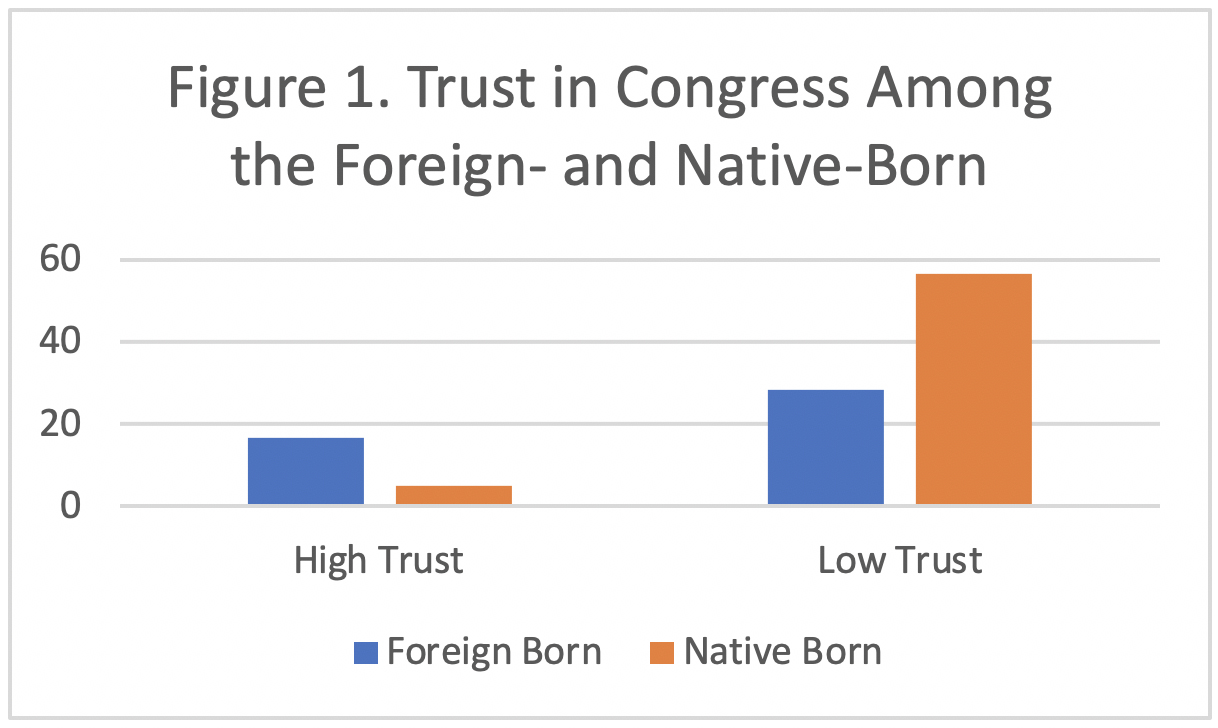 |
I came upon these results in running some cross-tabulations on the just-released 2021 General Social Survey (GSS), a project of the independent research organization NORC at the University of Chicago (with principal funding from the National Science Foundation):
[Since 1972,] the GSS has been monitoring social change and the growing complexity of American society. ... Except for the U.S. Census, [it] is the most frequently analyzed source of information in the social sciences. ... tak[ing] the pulse of America, and ... the only survey that has tracked the opinions of Americans over an extended period of time.
[The GSS] collects data on ... American society in order to monitor and explain trends in opinions, attitudes and behaviors. ... Altogether, the GSS is the single best source for sociological and attitudinal trend data covering the United States. It allows researchers to examine the structure and functioning of society in general, as well as the role played by relevant subgroups.
Because GSS survey questions break down the nativity status of respondents — whether born in the U.S. or in another country — the survey allows us to compare and contrast the attitudes of the native-born and the foreign-born on a large number of issues. I had the GSS data explorer run some cross-tabulations, which anyone can do. Here are some other intriguing results:
Politics
Foreign-born respondents indicated a higher level of support for the Democratic Party (strong support/support/independent close to the Party) than did the native-born — 51.4 percent (immigrants) vs. 42.8 percent (natives). Immigrants also exhibited a much lower level of support for the Republican Party — 17.9 percent (immigrants) vs. 32.6 percent (natives) and are more likely to be independents not close to either party — 29.8 percent (immigrants) vs. 21.4 percent (natives).
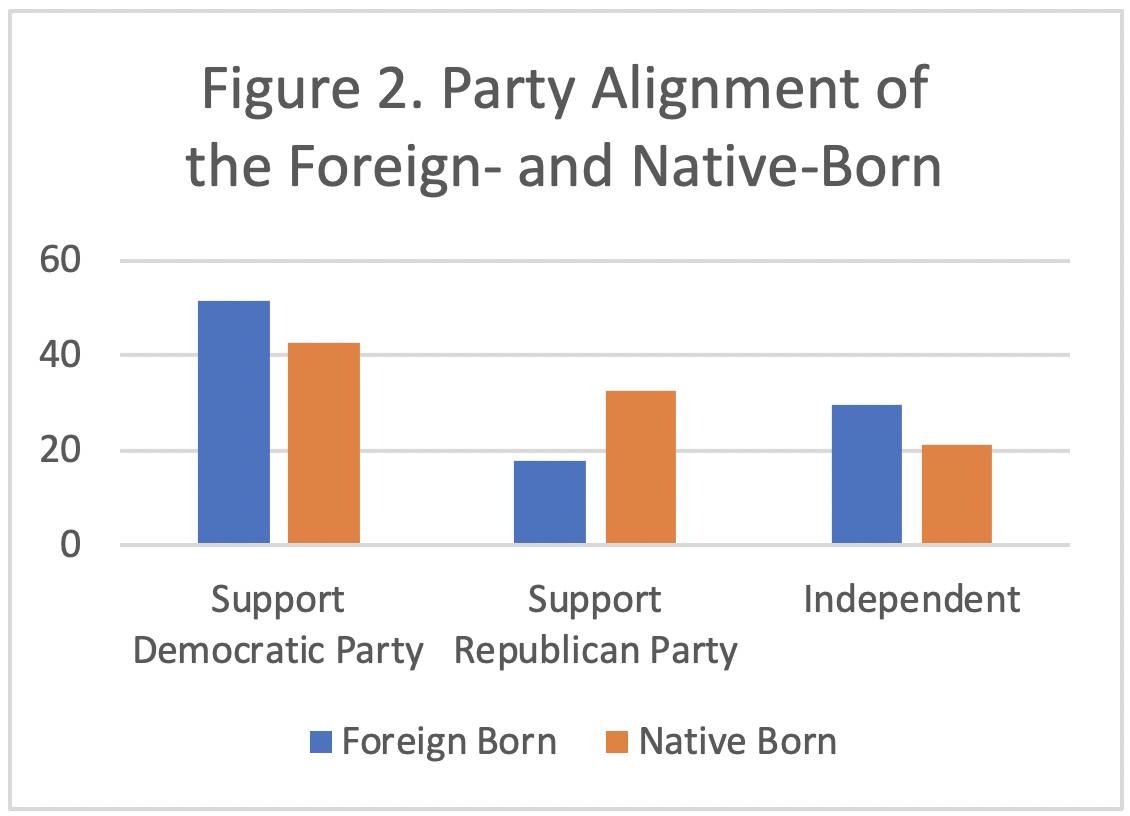 |
Somewhat more of the foreign-born self-identify as liberal (extremely to slightly) than as conservative (extremely to slightly) — 34.7 percent vs. 26.3 percent, while more of the native-born self-identify as conservative than liberal — 32.9 percent vs. 30.0 percent.
 |
These results are reflective of Professor James Gimpel’s conclusion that “the enormous flow of legal immigrants into the country ... has remade and continues to remake the nation's electorate in favor of the Democratic Party.”
Capitalism/Socialism/The Welfare State
Foreign-born respondents are less likely than the native-born to prefer a “middle-class” society where most people are in the middle — 47.2 percent (immigrants) vs. 55.7 percent (natives), while the foreign-born are more likely to prefer one with many people near the top and only a few near the bottom — 33.1 percent (immigrants) vs. 25.3 percent (natives).
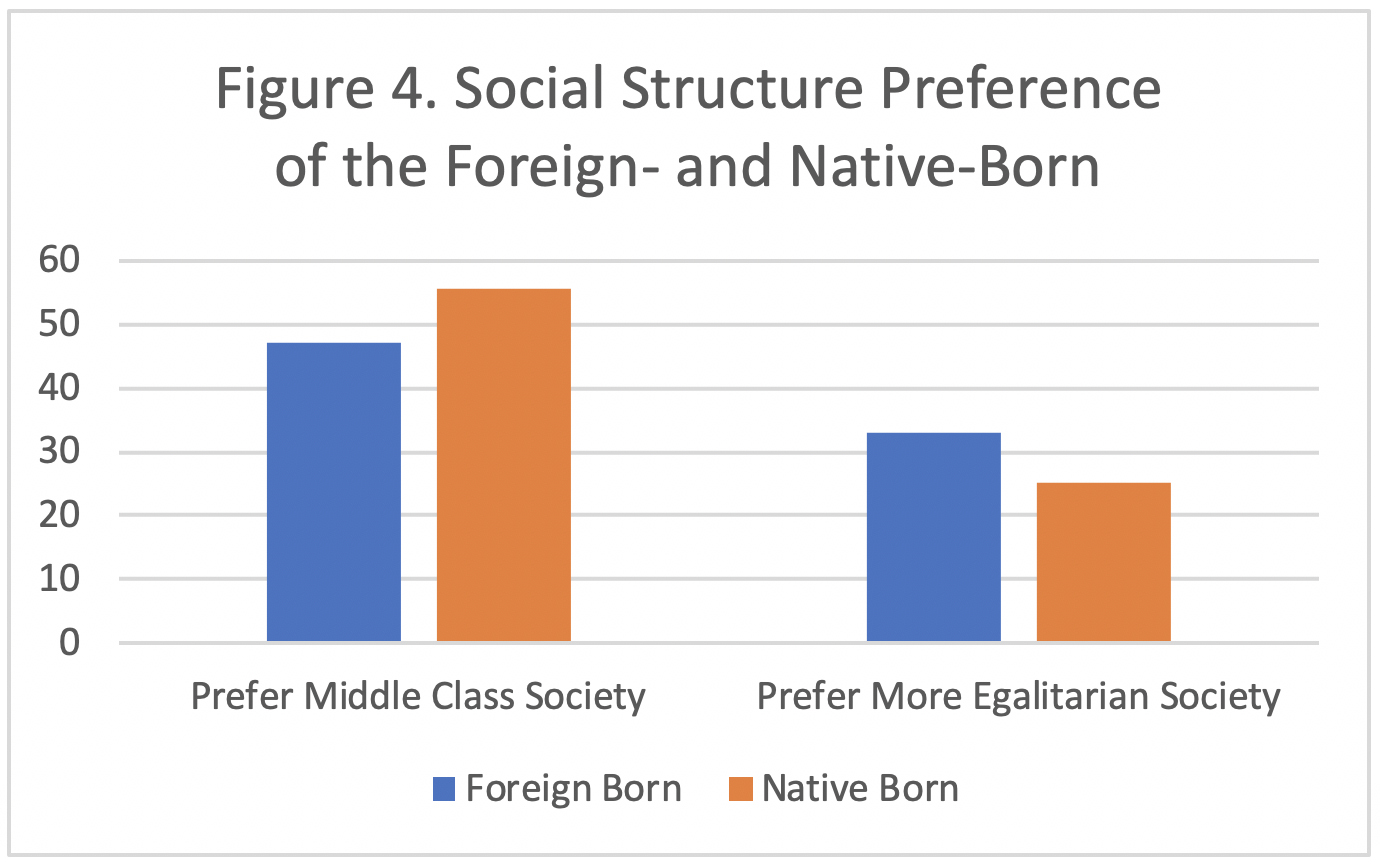 |
In line with these results, the foreign-born are more likely than the native-born to believe (strongly agree/agree) that income differentials in the U.S. are too big and that the differences between rich and poor too large — 82.1 percent/73.7 percent (immigrants) vs. 71.4 percent/55.6 percent (natives). The foreign-born are also somewhat more likely to believe that the rich should pay a larger share of taxes — 74.5 percent (immigrants) vs. 71.2 percent (natives).
 |
The foreign-born are much more likely than are natives to believe that government should “do more” — 76.6 percent (immigrants) vs. 56.9 percent (natives), while they are notably less likely to believe that government does “too much” — 8.4 percent (immigrants) vs. 23.7 percent (natives). The foreign-born are also less likely than natives to believe that we are paying too much for welfare programs — 22.4 percent (immigrants) vs. 33.8 percent (natives).
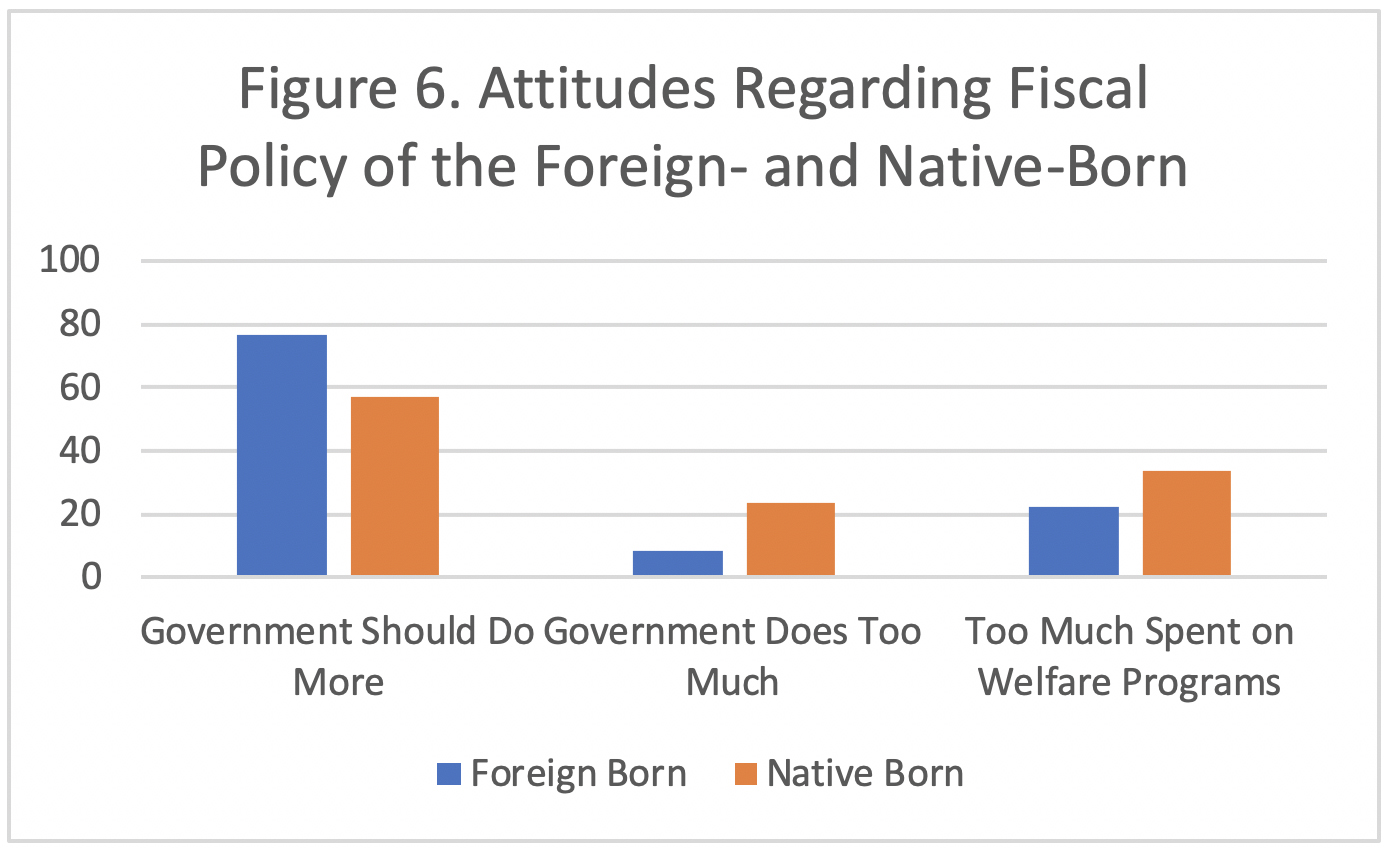 |
The foreign- and native-born are both equally likely to believe that allowing businesses to make good profits is the best way to improve everyone’s standard of living — 47.6 percent (immigrants) vs. 48.7 percent (natives), but the foreign-born are slightly less likely to believe that private enterprise will solve U.S. problems and slightly more likely to believe that the government should take steps to limit the pay of executives at major companies — 28.3 percent/43.1 percent (immigrants) vs. 31.6 percent/41.0 percent (natives). Possibly reflective of the societies from which they come, foreign-born respondents are twice as likely as the native-born to feel it important (essential to fairly important) to give bribes to get ahead — 21.3 percent (immigrants) vs. 10.4 percent (natives).
These results are also reflective of Gimpel’s conclusion that “[i]mmigrants ... have policy preferences when it comes to the size and scope of government that are more closely aligned with progressives than with conservatives.”
Crime/The Criminal Justice System
The foreign-born are much more likely than the native-born to be afraid to walk home at night in their neighborhoods — 43.5 percent (immigrants) vs. 34.2 percent (natives). Yet, they are much less likely than natives to have guns at home — 11.7 percent (immigrants) vs. 39.5 percent (natives).
While a majority of foreign-born respondents believe that the courts are not dealing harshly enough with criminals and that too little is being done to halt rising crime rates, they do so at lower rates than native-born respondents — 43.1 percent/60.5 percent (immigrants) vs. 51.5 percent/62.7 percent (natives). And they are much less likely than the native-born to believe that we are spending too little on law enforcement — 24.3 percent (immigrants) vs. 45.0 percent (natives). Foreign-born respondents are somewhat less likely to oppose moving police funds to social services — 53.7 percent (immigrants) vs. 58.9 percent (natives).
 |
The foreign-born are much less likely to approve of a police officer striking a citizen — 48.5 percent (immigrants) vs. 68.9 percent (natives). This is true even when given the scenario of a citizen attacking a police officer with fists or attempting to escape custody — the foreign-born approve of the police officer striking the citizen at a far lower rate than do natives — 58.9 percent/43.1 percent (immigrants) vs. 80.5 percent/61.3 percent (natives) — except that immigrants are much more likely than are natives to approve of the police officer striking a murder suspect — 35.9 percent vs. 19.9 percent.
 |
Discrimination
Foreign-born respondents are noticeably less likely to feel alienated than are the native-born:
- While 8.0 percent of immigrants believe that people frequently act as if they are afraid of them (from almost every day to a few times a month), 10.7 percent of natives feel this way, and while 82.4 percent of immigrants believe it happens infrequently (from never to less than once a year), 73.8 percent of natives feel this way.
- While 26.8 percent of immigrants feel that they are frequently treated with less courtesy and respect than others (from almost every day to a few times a month), 31.1 percent of natives feel this way, and while 73.2 percent of immigrants feel it happens infrequently (from never to less than once a year), 68.9 percent of natives feel this way.
- While 11.1 percent of immigrants feel that they frequently receive poorer service in restaurants or stores (from almost every day to a few times a month), 12.8 percent of natives feel this way, and while 89 percent of immigrants feel it happens infrequently (from never to less than once a year), 87.2 percent of natives feel this way.
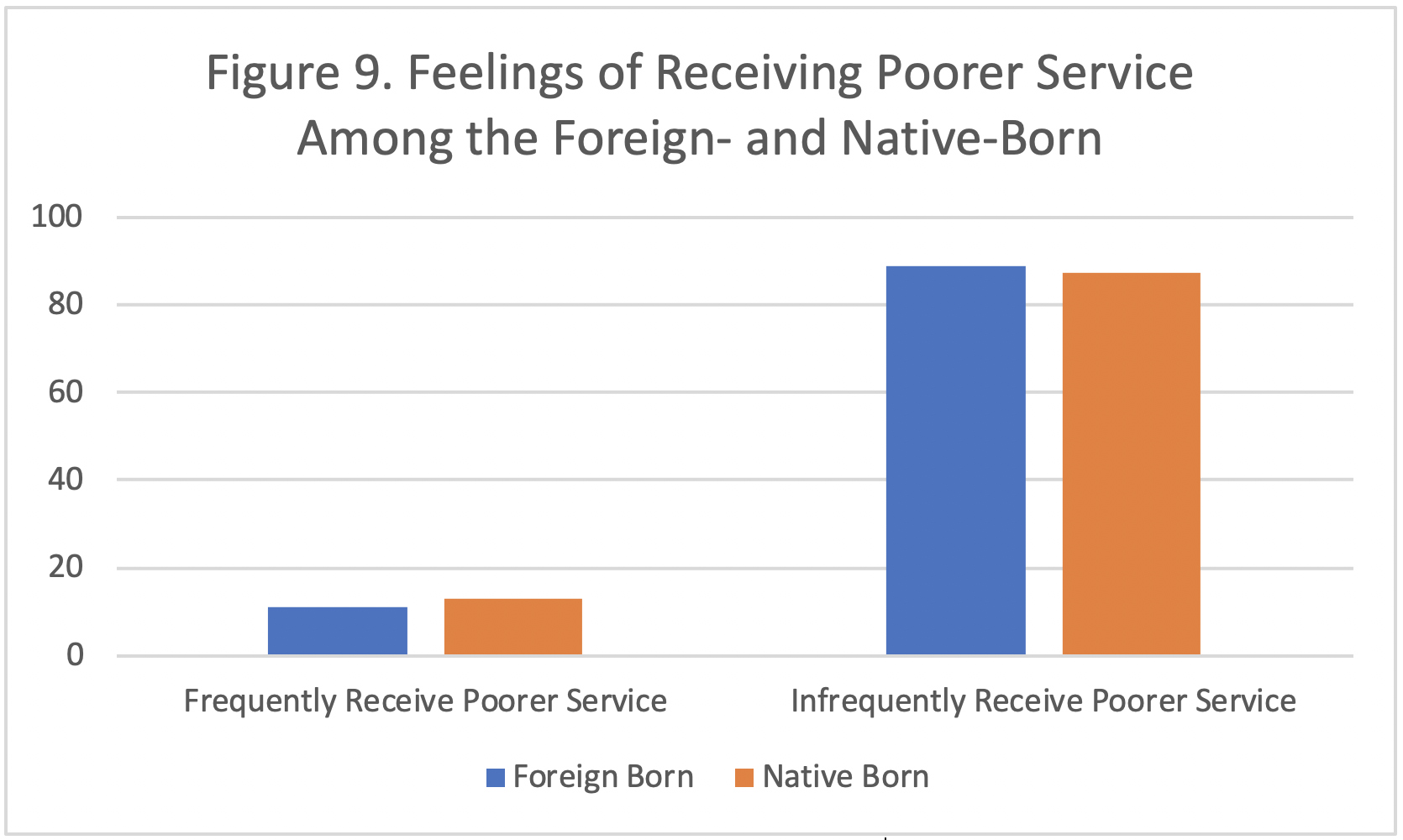 |
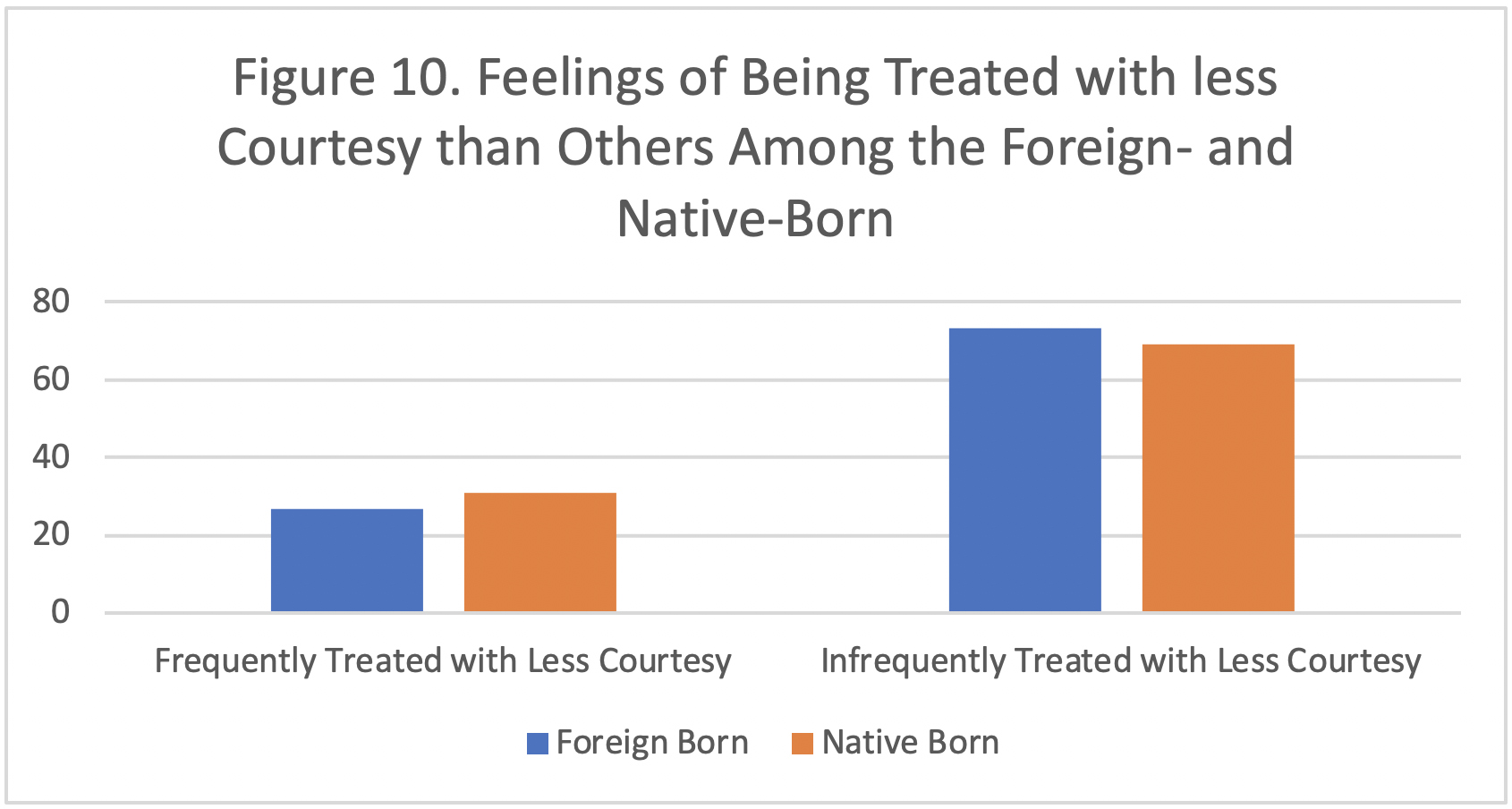 |
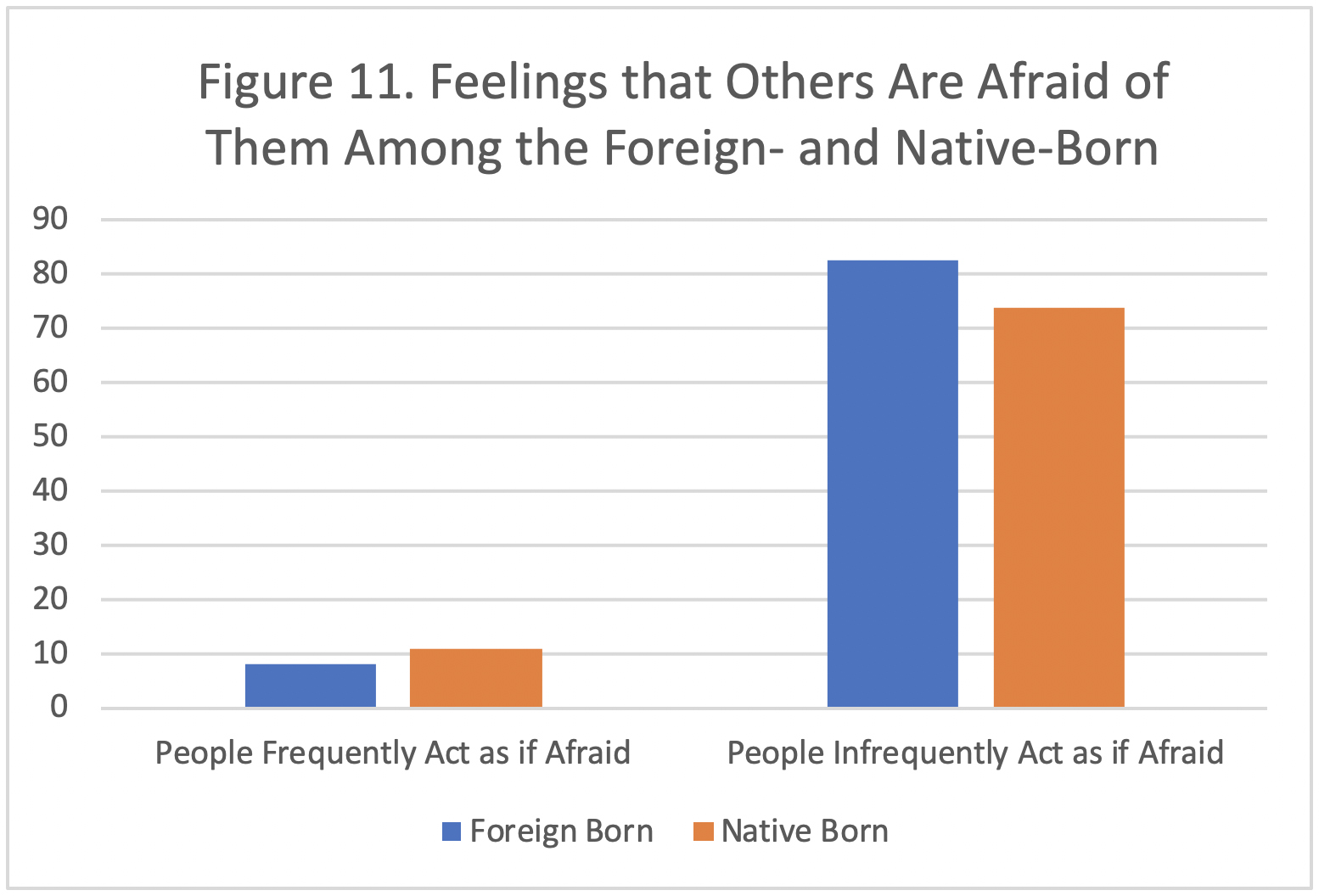 |
These results, while not broken down by the race of immigrants, are reflective of my conclusion that:
[D]espite widespread reporting of our racial strife, Black immigrants continue to come to America in ever increasing numbers. Once here, their belief in American greatness remains intact. ... In this we can take solace and even dare contemplate that our racial divide may be exaggerated.
Immigration
Not surprisingly, foreign-born respondents are much more likely than are the native-born to believe that immigration should be increased (a little/a lot) — 32.7 percent (immigrants) vs. 23.6 percent (natives), and they are much less likely to believe that it should be reduced (a little/a lot) — 16.0 percent (immigrants) vs. 34.8 percent (natives) — 11.3 percent of immigrants believe that immigration should be increased a lot, compared to 7.6 percent of natives, while 5.5 percent of immigrants believe it should be reduced a lot, compared to 17 percent of natives). Still, over half of immigrants (51.3 percent) do believe that immigration levels should remain the same (as do 41.6 percent of natives).
 |
Finally, 17.1 percent of foreign-born respondents believe (strongly agree/agree) that America should limit immigration to protect our way of life, compared to 38.1 percent of natives, while 48.2 percent of immigrants disagree (strongly disagree/disagree) with this proposition, as do 35.1 percent of natives.
 |
